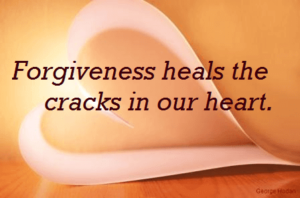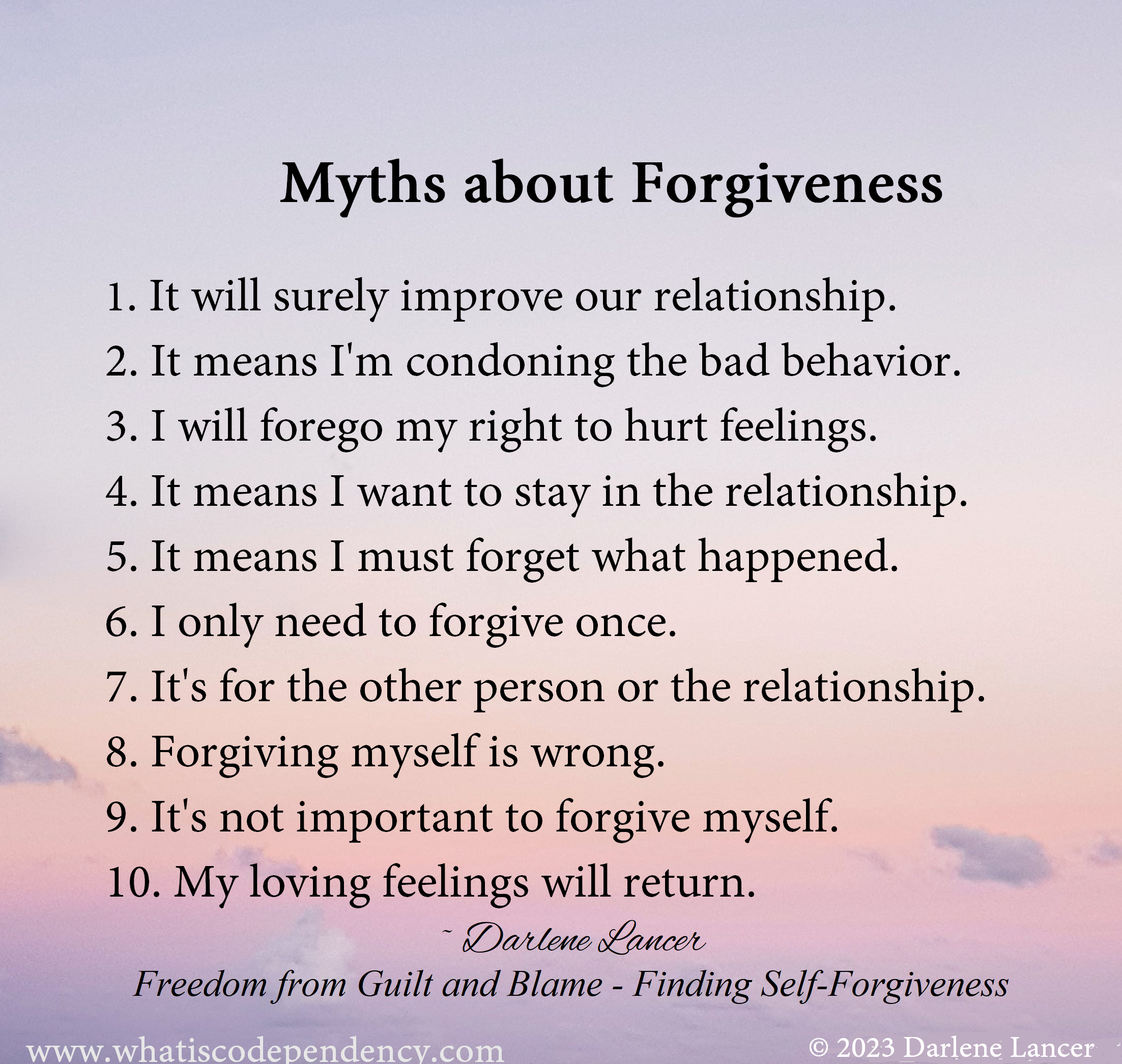 Forgiveness can sometimes feel impossible or even undesirable. Other times, we forgive only to be hurt again and conclude that forgiving was foolish. Both situations arise from confusion about what forgiveness really means. Forgiveness doesn’t require that we justify or minimize our hurt or the harm caused, or that we forget or condone someone’s behavior. In fact, for self-protection, we may decide to never see the person again.
Forgiveness can sometimes feel impossible or even undesirable. Other times, we forgive only to be hurt again and conclude that forgiving was foolish. Both situations arise from confusion about what forgiveness really means. Forgiveness doesn’t require that we justify or minimize our hurt or the harm caused, or that we forget or condone someone’s behavior. In fact, for self-protection, we may decide to never see the person again.
Often, people forgive AND forget, and continue to put themselves in harm’s way. They forgive and then rationalize or minimize their loved one’s abuse or addiction. This is their denial. This may even contribute to it by enabling.
Myths about Forgiveness
Unfort unately, people have many incorrect ideas about forgiveness, which blocks them from forgiving and finding peace within themselves.
unately, people have many incorrect ideas about forgiveness, which blocks them from forgiving and finding peace within themselves.
“Forgiveness is releasing a prisoner and discovering the prisoner was you,” said Hilary Clinton.
You can still disapprove and be sad or hurt when you forgive. It’s important not to deceive yourself or use forgiveness to manipulate the other person by believing it will improve the relationship or they will return your goodwill. The main point is that forgiveness is for you.
Benefits of Forgiveness
When we hold a grudge, hostility can sabotage our ability to enjoy the present and our future relationships. Ongoing anger harms us and actually has negative health consequences. It raises blood pressure, impairs digestion, and creates psychological symptoms, such as anxiety, depression, and mental and physical pain.
“Holding anger is poison. It eats you from inside. We think that hating is a weapon that attacks the person who harmed us. But hatred is a curved blade. And the harm we do, we do to ourselves.” (Mitch Albom, The Five People You Meet in Heaven)
The opposite is true of forgiveness, which improves mental and physical functioning. Although forgiveness can mean to pardon, generally, it means to let go of resentment, releasing us from obsessive or recurring negative thoughts. When we “forgive our enemies,” we relinquish any desire for payback, revenge, or that misfortune comes to them. Empathy and understanding toward our offender help us forgive. If we’re in a relationship, we attempt to rebuild trust and may set boundaries around our partner’s conduct in the future. Although the past impacts, informs, and shapes us, we’re able to make constructive changes and move on in peace.
When to Forgive
Forgiveness too soon may deny anger that’s needed for change. If we’ve been deceived, abused, or victimized, justified anger affirms our self-respect. It can motivate us to protect ourselves with appropriate boundaries. It helps us cope with grief and let go. It can smooth the progress of separation from an abuser. Usually, during a divorce at least one spouse is angry, facilitating the breakup.
Initially, we hurt. If we’ve been betrayed or rejected, it’s natural to feel pain – just like a physical wound. We must experience it and cry without self-judgment. We need time to feel the hurt and loss that has happened and to heal. Once, we feel safe and have gone through stages of loss, it may be easier to forgive.
Denial can make us forgive too soon or block forgiveness altogether. We should never deny, enable, or condone abuse. Denying that someone is an addict or abuser encourages us to continually accept broken promises, avoid setting boundaries, or stay in a toxic relationship. Denying that a loved one isn’t the ideal we want or imagined only feeds our disappointment and resentment. Accepting that you’re a partner or our parents are flawed, as we all are, can open the door to acceptance and forgiveness.
If forgiveness is withheld too long, it can impede completing the stages of grief and lead to bitterness. Many codependents are uncomfortable with feeling or showing anger. Instead, they’re preoccupied with resentment and replay negative scripts and events in their minds. Resentment can disappear when we give ourselves permission to be angry and allow feelings of anger and sadness to flow. They may not even need to be expressed to the person who hurt us.
How to Forgive
It takes conscious reflection, a decision, and often prayer to let go and forgive. The following are some suggestions:
- If you hold shame or guilt about your own behavior, this can block your ability to forgive.
- Be sure to work through the stages of grief. (See “Recovery from Breakups and Rejection.”)
- Keep in mind that forgiveness relieves you of pain. It’s medicine for you.
- Think about the ways that resentment negatively holds you back and affects your life.
- You’re not responsible for someone else’s behavior – only your own. Consider your contribution to the situation. Perhaps you didn’t communicate your expectations or boundaries, provoked the person, or denied his or her capacity to hurt you.
- Try to see the person’s behavior and attitude from his or her point of view in the context of their life experience. Did he or she intentionally try to hurt you? In other words, develop empathy, but this doesn’t justify abuse or mean you should forget they’re capable of repeating it.
- Praying for the other person is effective. See the practice described in my ebook, Spiritual Transformation in the Twelve Steps.
Self-Forgiveness
Sometimes we must forgive ourselves before we’re ready to forgive someone else. We often blame others when we feel guilty. We can hold onto resentment and refuse to accept responsibility for our actions to avoid feeling guilty. Although it’s important to reflect upon and take responsibility for our contribution to the problem, we need to forgive ourselves for any part we played. It may be harder to forgive ourselves than someone else. If you continue to feel guilty, do the exercises in Freedom for Guilt and Blame: Finding Self-Forgiveness.
Reconciliation
Reconciliation may or may not follow forgiveness. If we were hurt by someone close to us and want to maintain the relationship, then reconciliation might require them to take responsibility for their actions, make amends, and have an agreement not to repeat their behavior. See my blog, “Rebuilding Trust.” If trust was deeply broken with deception or an affair, couples counseling may be necessary in order to heal. Sometimes, the relationship is stronger as a result.
In some cases, we must clearly recognize and believe that the person we care about won’t change, and that their behavior reflects their wounded self. Letting go of expectations that they act differently can set the stage for acceptance of reality. We may decide to continue the relationship on less intimate terms or with different boundaries that protect you. For example, you may choose to only spend time with an addict when, or on the condition that, he or she is sober, or see an abusive person in a safe place, for short visits, and/or with a third person present.
The other person might not be willing to take responsibility for his or her behavior or forgive us for ours, but forgiveness is for our benefit. Other people’s anger hurts them, and our anger hurts us. Remember that forgiveness increases our integrity and peace of mind. It heals the cracks in our hearts.
©Darlene Lancer 2016, 2023

So it’s taken me a long time but I think my husband manipulates me. If I get angry, even when justifable, he always tries to “shoosh” me. He squelches it and t g at makes me angrier.
He uses anger to shut me up. Nearly every time I express displeasure with our relationship or circumstances, instead of listening or us talking he escalates into anger. Of course as a codepend, I hate and avoid anger so this keeps me in my place. We’ve been to counseling at my iintimation but after 1 1/2 years I stopped because I felt it was going nowhere. He played games in sessions. I will make appt with you soon. I think it would help
So it’s taken me a long time but I think my husband manipulates me. If I get angry, even when justifable, he always tries to “shoosh” me. He squelches it and t g at makes me angrier.
He uses anger to shut me up. Nearly every time I express displeasure with our relationship or circumstances, instead of listening or us talking he escalates into anger. Of course as a codepend, I hate and avoid anger so this keeps me in my place. We’ve been to counseling at my iintimation but after 1 1/2 years I stopped because I felt it was going nowhere. He played games in sessions. I will make appt with you soon. I think it would help
You’d might read my post, “How To Spot Manipulation,” and one on verbal abuse. Also, read How To Speak You Mind and listen to the webinar, “How to Be Assertive” to learn to set boundaries.